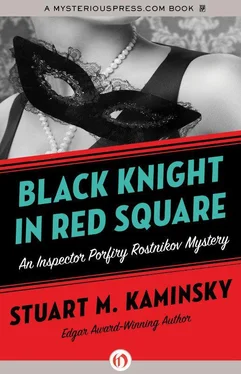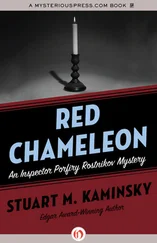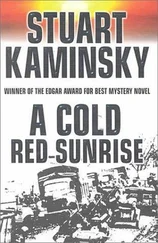Stuart Kaminsky - Black Knight in Red Square
Здесь есть возможность читать онлайн «Stuart Kaminsky - Black Knight in Red Square» весь текст электронной книги совершенно бесплатно (целиком полную версию без сокращений). В некоторых случаях можно слушать аудио, скачать через торрент в формате fb2 и присутствует краткое содержание. Год выпуска: 1983, ISBN: 1983, Издательство: Fawcett, Жанр: Полицейский детектив, на английском языке. Описание произведения, (предисловие) а так же отзывы посетителей доступны на портале библиотеки ЛибКат.
- Название:Black Knight in Red Square
- Автор:
- Издательство:Fawcett
- Жанр:
- Год:1983
- ISBN:9780804104050
- Рейтинг книги:5 / 5. Голосов: 1
-
Избранное:Добавить в избранное
- Отзывы:
-
Ваша оценка:
- 100
- 1
- 2
- 3
- 4
- 5
Black Knight in Red Square: краткое содержание, описание и аннотация
Предлагаем к чтению аннотацию, описание, краткое содержание или предисловие (зависит от того, что написал сам автор книги «Black Knight in Red Square»). Если вы не нашли необходимую информацию о книге — напишите в комментариях, мы постараемся отыскать её.
Black Knight in Red Square — читать онлайн бесплатно полную книгу (весь текст) целиком
Ниже представлен текст книги, разбитый по страницам. Система сохранения места последней прочитанной страницы, позволяет с удобством читать онлайн бесплатно книгу «Black Knight in Red Square», без необходимости каждый раз заново искать на чём Вы остановились. Поставьте закладку, и сможете в любой момент перейти на страницу, на которой закончили чтение.
Интервал:
Закладка:
“Yes,” said Tkach, thinking that examples, from his experience, didn’t seem to have much effect on the behavior of such young men.
“Ludmilla,” the judge said to the secretary, “a copy of the trial report for the police.”
With that, the judge turned his back, coughed again, and returned to his little office. Ludmilla brushed past Sasha and went into the corridor.
All in all, Tkach thought, Soviet justice was swift and clear, which was just the way he and most of the police wanted it.
TWELVE
Wolfgang Bintz had not always been a fat man. He had been thin as a young man, but then his boyhood and very early manhood had coincided with the decline and fall of Berlin, during which almost everyone was thin. If one was not thin at the end of the war, one had much to explain.
Bintz had vivid recollections of his agile former self. One particularly vivid memory was of running down a narrow street off the Wilhelmstrasse in 1945 after he and Bruno Wolfe had killed a Russian soldier. It was at night. The soldier was looking in a bakery window, and Bruno hit him with a metal bar. Wolfgang had always assumed the Russian died. He had not stopped to check, nor had there been any published report of the murder.
It was the running Bintz remembered. They ran for miles, the city blurring to their right and left, through bombed-out streets.
Then, when the war was over, Wolfgang got a speaking part in a movie. He enjoyed the work. And he enjoyed the eating. He ate and ate and soon became a fat young man. Subconsciously, he was storing food away in case another time of starvation should descend on Germany.
With the fat had come an aversion to moving quickly or walking far. He let his camera move for him. His films were full of movement and action. They were the execution of his imagination. In them, he relived that run through the streets of Berlin after the attack on the Russian soldier.
And now he was being called on to run again, or at least walk a long distance. The run might come later. He left the hotel at three o’clock Saturday afternoon after telling the girl from Intourist that he wanted to walk around and see Moscow on his own. It was not at all what he wanted to do, but she was glad to be relieved of responsibility and let him go without protest.
Bintz had a map and a vague idea of how to get where he was going. He found Sverdlov Square, looked around at the Hotel Metropole and the stretch of wall that dates back to the sixteenth century. He found 25th October Street and made his way along the walls of broken brick. Near the old Stock Exchange, he turned in Rybny Pereulok, or Fish Lane, which was little more than an alley. This took him to Razin Street with its row of government office buildings. He then found the Znamensky Monastery and, as directed, stood before it. He knew that he was a few hundred yards from the Hotel Rossyia and that he could have gotten to this spot in less time. In truth, he had been tempted to neglect the precautions, to save having to walk, but he had overcome that desire and now stood, the crowd moving past him, pretending to examine the seventeenth-century building in which he had no interest. He did imagine a werewolf atop the roof growling down in defiance at a troop of armed Russian soldiers, the moon behind him.
He almost managed to lose himself in the vision of the werewolf leaping down, the camera on a massive boom rising over him. His right hand began to rise inadvertently to simulate the smooth animal movement and, as it did so, he felt something against his side.
It was a familiar feeling, and Bintz almost shouted in German that his pocket had been picked, but he had nothing in the side pocket of his pants. His hand slapped down and now felt something small, about twice the size of a pfennig and much heavier.
Bintz looked at the figures passing by in both directions, but no one was looking at him. He had no idea which of them had dropped the object into his pocket. He turned back to the monastery without seeing it and let his hand slide into the pocket to touch the solid metal object. He knew what it was, and he knew that a step had now been taken that would make it difficult for him to back out of this.
He cursed his own stupidity. He cursed the woman who had arranged this. He cursed World Liberation and almost cursed his mother for bringing him into a world where such a thing could happen. Then, growling at a young man who bumped into him, Bintz began the walk back to his hotel in as direct a line as possible.
Not far down the street at number 18, a man in a dark short-sleeved shirt seemed to be taking a picture of the museum that had once been the birthplace of the Romanovs. Actually, he was considering whether to report the odd behavior of the German to Chief Inspector Rostnikov. The policeman was under the impression that all Germans were a bit odd. This fat man had waddled for almost a mile past dozens of historic buildings, stopped and stared at the old monastery, and then suddenly acted as if he had been shot in the thigh.
Germans, the policeman thought, were not to be trusted. He decided to report the man’s behavior to Rostnikov immediately as he had been ordered to, even if he could make no sense of it.
In the crowd, far ahead of the detective and Bintz, the dark-eyed woman hurried toward her next appointment. It was all very dangerous, but she had no choice. She felt exhilarated.
Within fifteen minutes she was inside a department store on the New Arbat standing beside two women who were examining dolls. The dolls had blond curly hair and had been made in Hungary, imitations of their American counterparts.
“So much money,” complained the younger of the two women, biting her lower lip.
“What else is there to do with the money?” her companion said. “It’s her birthday.”
The dark-eyed one glanced across the store and picked up one of the dolls. She saw the person she was seeking, and doubt struck her. He was quite conspicuous, clearly foreign. He craned his neck and looked around the store. If he was being followed, his tail would certainly recognize this as an assignation. She wondered if she could count on him and decided she could not. He did not even pretend to look at the goods on the wooden tables but scanned the crowd anxiously.
The dark-eyed woman trailed along with the two women customers, turning her head as if taking part in their conversation. They could have been three young mothers on a shopping trip, as they moved past the tall foreigner, who looked down to check his watch. At that moment, the dark-eyed one reached over and dropped the object from her palm into his pocket. Taking a step forward, she touched the sleeve of one of the two young women and said, her voice polite, “Do you know if there is a sale on fabrics today?”
A passerby would have thought, looking in their direction, that the three women knew each other. This, in fact, was just what James Willery thought. He had felt nothing enter his pocket and did not know the object was there.
“I know of no sale,” said one of the two women.
“Nor I,” said the other.
The dark-eyed woman with the glasses thanked them, kept up the conversation briefly as they walked along, and then veered off in another direction toward a door. Only when she reached the door did she glance back at the tall Englishman who continued to look nervously around. Either he was a fine actor or he had no idea that the detonator was now in his pocket. He would find it, she was sure, when he reached for some change. That concerned her less than the bored-looking man four counters away who was pretending to examine a plastic suitcase. The man’s hands were on the suitcase, but his eyes were on the Englishman.
It didn’t matter. She had done what she could. It really didn’t matter at all if the Englishman was caught, but she hoped he would complete his assignment before that happened. Chance, while kept to a minimum, could work either for or against her. Her only hope was to control events as much as she could, have as many options for action as possible, and hope that the odds were in her favor. She had learned that the odds were usually in favor of the person who initiated action. It was far safer to act than to react.
Читать дальшеИнтервал:
Закладка:
Похожие книги на «Black Knight in Red Square»
Представляем Вашему вниманию похожие книги на «Black Knight in Red Square» списком для выбора. Мы отобрали схожую по названию и смыслу литературу в надежде предоставить читателям больше вариантов отыскать новые, интересные, ещё непрочитанные произведения.
Обсуждение, отзывы о книге «Black Knight in Red Square» и просто собственные мнения читателей. Оставьте ваши комментарии, напишите, что Вы думаете о произведении, его смысле или главных героях. Укажите что конкретно понравилось, а что нет, и почему Вы так считаете.












